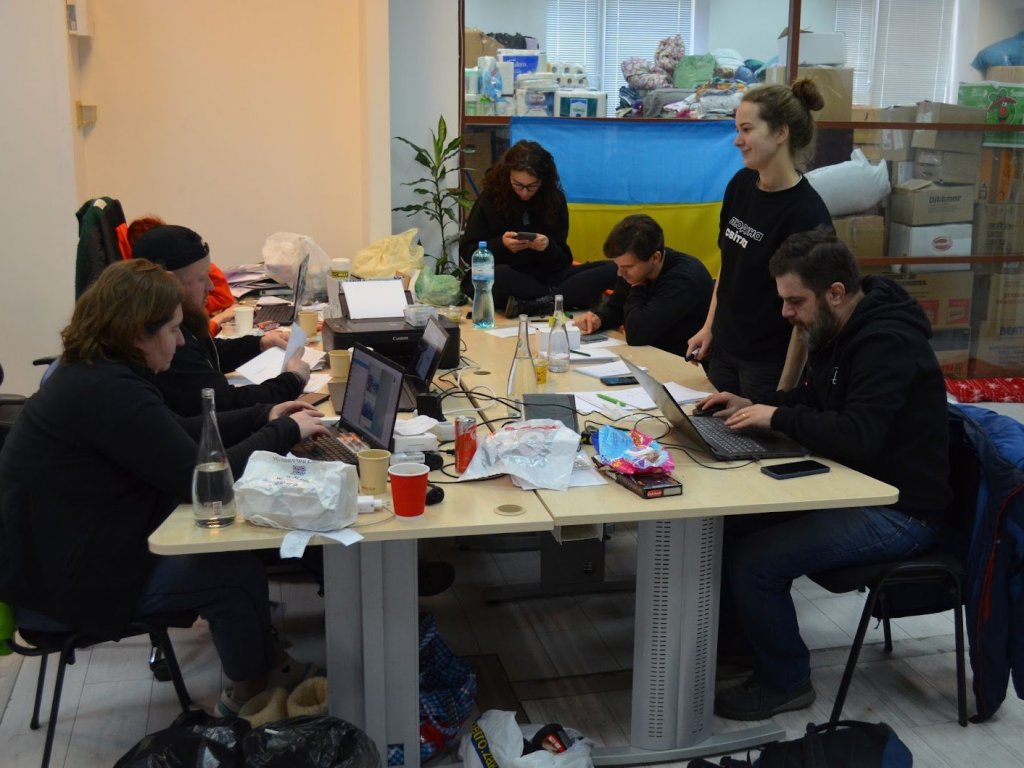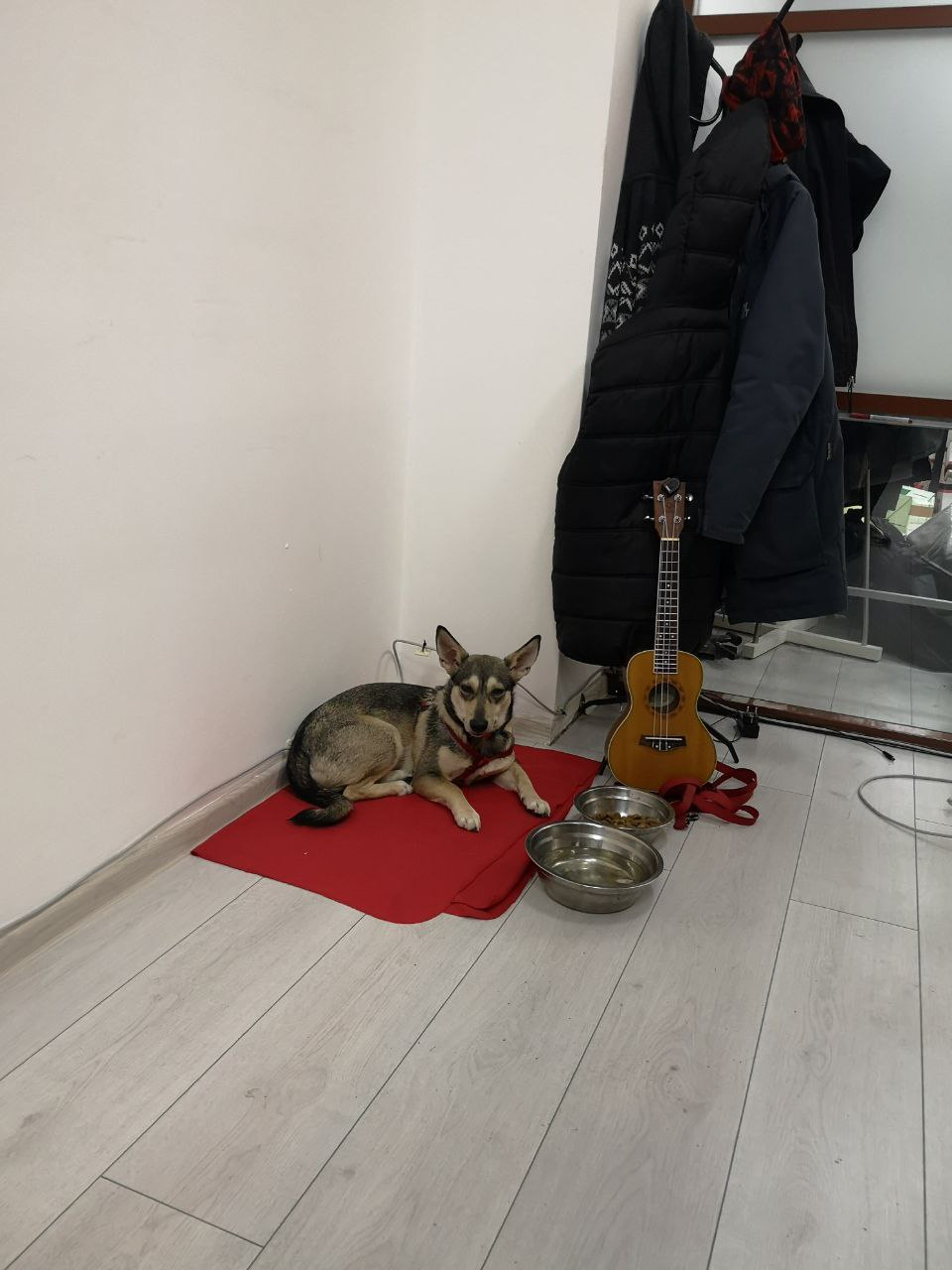"Flock" working for victory. One day in the life of the volunteer headquarters in Kyiv


The Volunteer Headquarters of the Flock has been working in Kyiv since the beginning of the Russian invasion. The informal non-governmental organization, founded in 2013, became a powerful volunteer movement during the war. Thanks to personal acquaintances and connections, we managed to quickly expand the work of the warehouses with the most necessary, organize the delivery of food and medicine in Kyiv and evacuate the residents of Chernihiv.
The members of the movement help the military, territorial defense and civilians of the capital. As well as retirees, migrants, people with children and hospital patients. We visited their headquarters and spent the day there.
I'm going to Kyiv. Today is a cold and cloudy morning. Sharp gusts of wind fill the eyes with dust, the ears listen to distant explosions. Some are not so far away. There are almost no people and cars on the streets, some passers-by go on business without stopping. I notice two trams ahead. The first thought was, "Wow, can I drive?" I come closer and see that they are not moving, and cars are passing carefully between them. It seems that the tram has become an improvised barricade against the losing occupiers.

The volunteer center is located in a low bright building in a residential area. I approach the porch, and a cargo van is already parked there. People appear around the corner and start carrying boxes. A very tall man with a strong physique in his 30s walks past me, followed by several young men and a short uncle in his 40s and 50s - black-haired, with thick bristles. He speaks with a light Georgian accent. I see another confused middle-aged man next to me.
“Why are you standing, do you want to help? His short uncle asks. "Take the box and carry it."
I'm waiting for an acquaintance to meet me, who promised to show me how everything works here. We say hello, let's go inside. Behind the front door is the reception of the office. Two windows are closed by curtains, a large thermos with hot water and a table with tea, cups, sweets.
I laugh at the thought: every time there is a shock in Ukraine, the first thing that comes next is food. A woman in her fifties brings sandwiches and urges volunteers to unload cars. People are ashamed, but begin to eat. I walk further down the corridor, but I feel the smell of sausage catching up with me.

What is a Flock?
"We founded the" Flock "during the Maidan (in 2013)," says Zhenya Talinovska, one of the organization's founders. "Every night they guarded the Maidan, organized bicycle delivery, dealt with headquarters and products."
In 2014, the Flock began volunteering for the front.
"Our guys took part in the liberation of Mariupol," Zhenya recalls. "We went there, raised a lot of money, bought everything we needed for the soldiers."
Prior to the full-scale Russian invasion on February 24, 2022, she worked as a designer for an IT company, assisted with fundraising for the Everyone Can Fund, and supported orphanages. She is currently coordinating an initiative to help the Ukrainian military in Kyiv.

When forests burned in Chernobyl in 2020, Zhenya and the Flock traveled to Chernobyl to raise money to support rescuers and help firefighters put out fires. “Our friend worked there as a drone operator with a thermal imager. He was looking for small flames. Because of him, we went out there and spent a few weeks collecting money, bringing shovels, food, everything we needed. ”
Zgraya is an informal organization, it is not registered, no one works in it. "The" flock "gathers and starts helping whenever the country or the city needs it, and then continues to live its life," says Zhenya about the work of his public association.
The first priority is the Armed Forces, followed by SALW and civilians
Who do they help? According to Zhenya, the first priority is the Armed Forces, the second - SAR and civilians.
Soldiers are delivered equipment, medicine, food, power banks, lanterns and other devices - depending on the request. The same applies to civilians and SRS. The organization has four main areas: huge warehouses of medicines, humanities, hygiene products and clothing.

The place where we are is the volunteer "headquarters" and at the same time the composition of the "Flock". Everything there is, volunteers bought for donations or received from business or benefactors. Zhenya recalls that business often asks them: "We have a" milk "warehouse here, come by truck and take as much as you need."

Along the walls are several hundred boxes (from very small to huge), bags, piles of clothes, blankets, boxes of baby food, household chemicals and various medicines. In the corner there are a dozen and a half tables stacked on top of each other (like shelves). On them are blankets, blankets, boxes of shoes and bedding. On the shelves A4 sheets are signed with a black pen. I look at one of them. "Warm blankets 57 (crossed out), 53".

There are a handful of postcards on the table next to the baby food boxes. A small dog runs underfoot and cheerfully sniffs everyone who comes. He is very active and inquisitive. He sniffs new people and runs for a minute. He seems to be looking for a sausage.

I pick up a handful of postcards. There are about two dozen of them, painted with paint and felt-tip pens. Most in the colors of the Ukrainian flag and with words of support in Ukrainian and Polish. On one Ukrainian flag in the shape of a heart pierced with a sword. Two leaflets are signed in English. On the back they have a black marker "Ukraine, hold on, we, the Dutch, are sending you our support."

This part of the composition is managed by a broad-shouldered man with a lush mustache. He has a loud, well-set voice, and time and time again he bursts into laughter. Although the face shows fatigue.

People call him Fima. Without his permission, nothing appears or disappears here. When I come, he just decides how many shoes to give to the next group of applicants.
A new car with a load arrives, and a call for help is heard. I'm leaving. People line up in a chain and pass the boxes inside the building. At first the process seems chaotic, some people run here and there, some people stand still, some people look around in confusion.

But in an instant the whole chain is synchronized. Turn right - took the box. Turn left and handed over the box. Time and time again, people empty the cargo van with almost the same movements. It seems that they want more, but the driver does not give up.
I return to the building, go to the other wing. Food composition. Smells like onions and earth. At the bottom are bags of potatoes, boxes of ready-made breakfasts, canned food, packages of water and yogurt. An interior photo of an oriental bath hangs on the wall near the food warehouse. Marble, swimming pools, walls in floral ornaments.
Regarding food, Zhenya explains: “We help restaurants. They pack our products to prepare large portions for civilians, the Armed Forces and the SRO. We also collect food kits and deliver them to addresses. ”


Another area that the "Flock" volunteer is working on is home care. “We are conducting first aid courses on request, because we have a lot of military medics, and we have already done five pieces for sure, for restaurants where food is prepared, for some teams, for the military who go to the front to they knew how to provide first aid before the doctors arrived or before they took the wounded man to the hospital. ”

Suddenly, the voice of a man with a mustache (Fima) was heard: "People, stop, remember where you were and what you were doing, and go to the basement." The air alarm sounds. We go down to the basement, which turned out to be a gym. Large empty room with suspended ceiling illuminated by white office lamps. Around treadmills, dumbbells, exercise machines.
People are distributed around the hall, find a place to sit, and talk about life: about relatives, plans for the day and plans after the war. Someone about their bars and cocktails that they prepared. How waiters and bartenders worked. Others silently respond to messages on the phone.
I notice that in the middle of the room there is a dryer with wet clothes. Behind the curtains are mats with sleeping bags. Volunteers who work here often do not have time to return home before curfew and stay overnight at headquarters. The "extracurricular" activities of the "Flock" are several hundred volunteers who help people evacuate from Chernihiv, deliver food, medicine, and animal feed to Kyiv. Most of the volunteers learned about the activities of the "Flock" from social networks. They coordinate in public chats, bringing food and medicine to those who need it. Those who have cars also help with the delivery of bulk cargo.

Another area outside the headquarters is evacuation. Chernihiv is under constant fire and is partially surrounded, but thousands of people still live there. Volunteers go to the city, take women and children to Kyiv, where they find shelter and the most necessary things. During the first three days of evacuation, they managed to evacuate 900 people.

"Let's fight to rebuild everything"
Finally, I asked Zhenya what she would do first, when the war was over. "I'll spend the usual weekend," she says, "when you go to the movies, drink coffee in Podolchyk with friends, in the evening you go to your bar, everyone comes to you."
And then he adds: "And then we will work for the good of the Motherland to rebuild everything that has been destroyed here."

We will be grateful for your help:
4441111402770808
Yevheniia Talinovska
PayPal account
http://PayPal.Me/oknemof
This material was developed with the support of ISAR Unity under the Sectoral Civil Society Initiative, implemented by ISAR Unity in consortium with the Ukrainian Independent Center for Political Studies (UCIPR) and the Center for Democracy and the Rule of Law (CEDEM) with sincere support from the American people. United States Agency for International Development.
The contents of this article do not necessarily reflect the views of ISAR Unity, the views of the United States Agency for International Development or the United States Government.
Read also:
Daily Horoscope: What the Stars Predict for All Zodiac Signs
Which Zodiac Signs Have the Strongest Immunity? An Astrological Health Analysis
Lithuanian Athlete Disqualified for Protest Shirt: Global Sports Reaction
Battalion "Achilles" Demonstrates Its Capabilities to a U.S. Delegation
 How can you support Ukraine?
How can you support Ukraine?